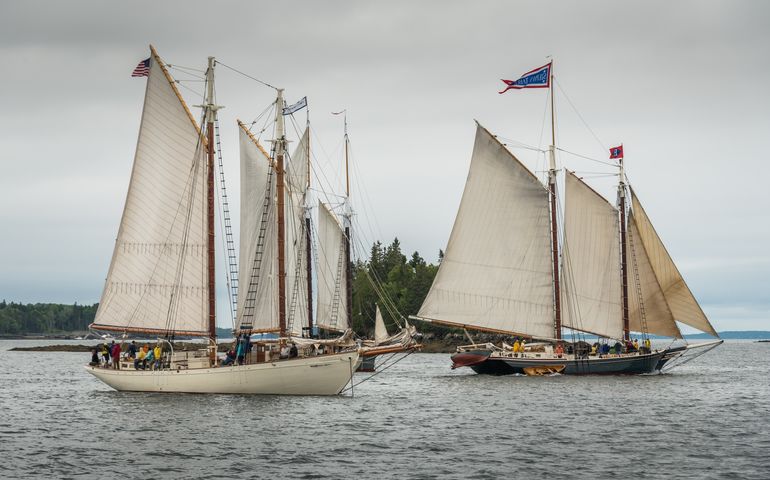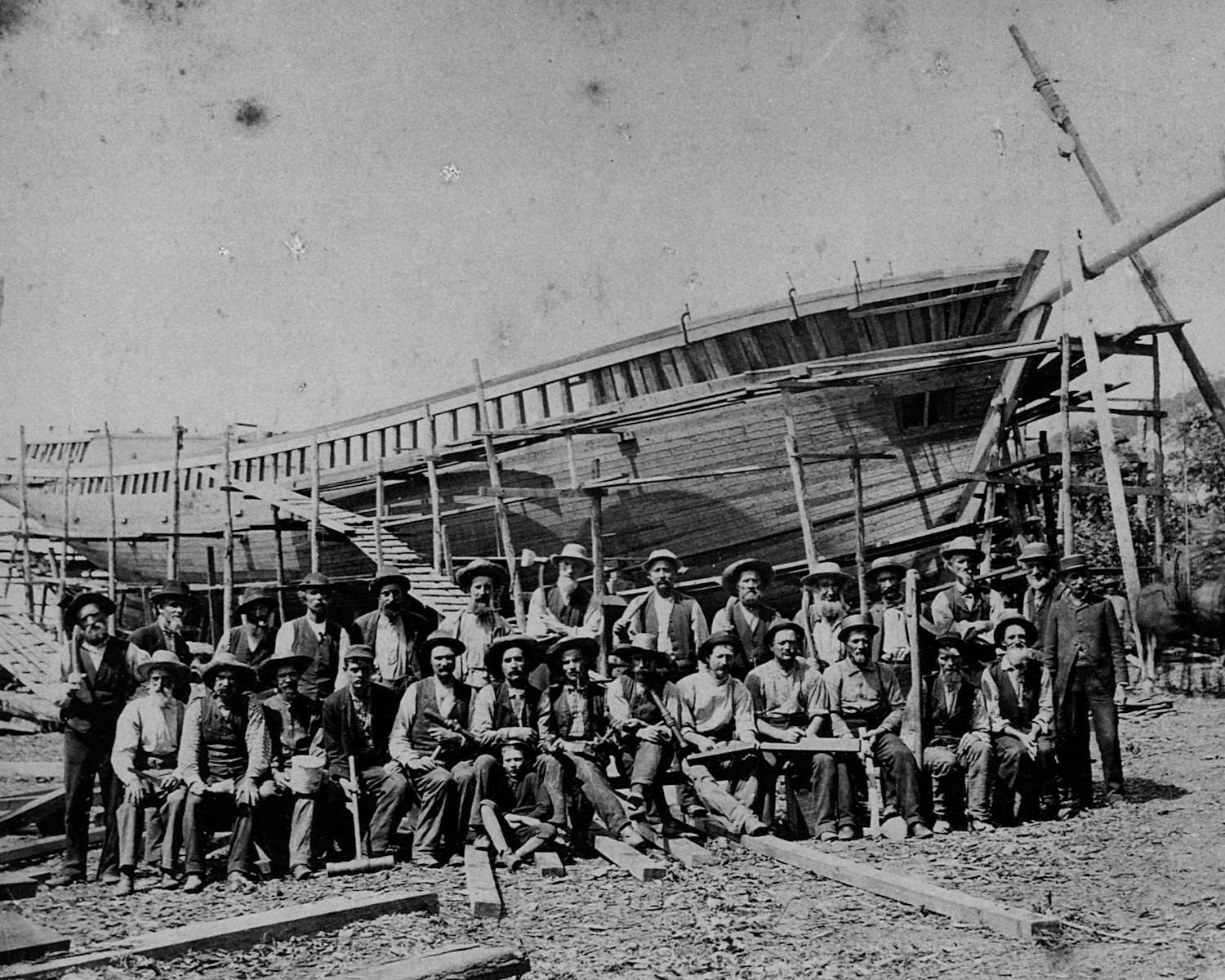
Rockland schooner captain prepares to set sail, testing the season
 Courtesy / Fred LeBlanc
Schooners Ladona, left, and Stephen Taber are seen here sailing in a past year.
Courtesy / Fred LeBlanc
Schooners Ladona, left, and Stephen Taber are seen here sailing in a past year.
The owner of two Midcoast passenger schooners homeported in Rockland is getting ready to begin operations this weekend, while the rest of the Rockland and Camden fleet sit out the season.
The schooner Ladona will set sail July 18 and schooner Stephen Taber is scheduled for its first trip of the season on July 23 with live entertainment provided by the Charlie Nobles Band.
Both are owned by Noah and Jane Barnes. Noah Barnes captains the Taber and has another captain, J.R. Braugh, skippering the Ladona.
The season usually starts over Memorial Day weekend. This year, the state’s business reopening plan delayed the start until July 1, when overnight charter boats and excursions of fewer than 50 people were allowed to begin.
In addition, members of the Maine Windjammer Association were working with the Department of Marine Resources to create guidance for a safe sailing environment.
The terms “schooner” and “windjammer” are used interchangeably and denote a traditional sailing ship.
To sail in 2020, overnight windjammer trips need to meet guidelines for lodging, restaurants and windjammers on top of rigorous Coast Guard licensing requirements.
Barnes developed additional protocols to ensure safe operations aboard his ships.
“We’ve taken it one step further than the already stringent protocols, and are asking every guest who comes sailing with us to attest to a negative COVID-19 test,” he said in a news release. “This is one way we can safeguard the guests and crew on board this summer.”
Protocols include safety and cleaning measures, and new itineraries to more remote, uninhabited islands to give plenty of room for social distancing while ashore.
Six of the Maine Windjammer Association fleet captains have opted to cancel trips this season; many issues played into their decisions. All members of the association have already created 2021 schedules, available on SailMaineCoast.com for those who like to plan trips in advance.
Cancellations vs. reservations
In late January both the Taber and the Ladona were 70% booked for 2020, which generally means they would be fully booked or nearly so during a typical season, Barnes told Mainebiz.

When the pandemic hit, “Cancellations were a bloodbath,” he said.
The goal now, operating with reduced passenger counts in order to maintain physical distance, is to achieve 50% bookings for what’s left of the season. That would earn about 25% of last year’s revenues, which were $500,000.
“That should just cover the expense of having crew and staying open and winterizing the vessel,” he said.
In a typical year, maintenance alone, on his vessels, costs $250,000 per year. The rest of the money goes toward payroll, marketing and overall operations.
Seven passengers had booked spots on the Ladona for its first trip, “which we count as a success this year,” said Barnes. As of this week, the Taber had nine guests booked for its first trip.
Many passengers who were previously booked for the next few months have decided to go ahead, based on the state’s and the vessel’s guidelines, he said. And reservations continue to come in.
“We got about six reservations between yesterday and today,” he said earlier this week.
But cancellations also keep coming. That includes a family charter on Ladona that canceled last week and was worth $20,000.
Spin-off effect
Typically, the Taber carries more than 500 people per season, and Ladona 400. Both have operated at or above 90% capacity for more than a decade, he said.
“Between the two boats, over 1,000 people come to Rockland,” he said. “Typically they stay one or two nights on each end of their stay” — while shopping, eating out, and frequently traveling onward to other destinations inland or along the coast.
Most passengers come from outside the state, with about 20% from New England, and other sizable batches from the mid-Atlantic corridor, the south and mid-northern states like Wisconsin. A fair number of passengers come from the West Coast. There’s a smattering of Europeans and Canadians.
Although the fleet was allowed to operate on a limited basis as of July 1, the 14-day quarantine was a deal-breaker, Barnes said, until the Mills administration exempted Connecticut, New York and New Jersey as of July 3, along with an earlier exemption of New Hampshire and Vermont.
Historic landmark
The Stephen Taber dates back to 1871, is today the oldest documented sailing vessel in continuous service in the United States, and is a National Historic Landmark.
The Ladona was christened in 1922 as a private yacht built by Hodgdon Yachts in East Boothbay Harbor.
During World War II, Ladona served as a submarine patrol vessel with the U.S. Navy and based at New York Harbor. After the war, it was a fishing dragger out of Stonington, Conn., and later a sail-training vessel and then a passenger vessel.

Barnes’ parents bought the Taber when he was 6. They moved the family to Camden from North Carolina in 1979 to run an excursion business.
“I grew up sailing on these boats,” he said.
He got his captain license when he was 21 and began running boats.
“Then I ran away from boats for a while,” he said. He spent 12 year away and ended up working in Manhattan for a marketing firm. When his parents were preparing to retire, Barnes realized he’d rather be on the water than in an office. He returned to Camden in 2003 and took over the business with Jane the following year.
Jane worked in the wine industry and developed a sophisticated wine program to go with the vessel’s strong food program. In 2013, they bought the Ladona, which was called the Nathaniel Bowditch at the time. It was dilapidated, so they restored the boat and its original name, and included more yachtsman-like amenities such as fine dining. Both boats now operate out of Rockland.
Barnes has seen a change in the way schooners are perceived by the general public.
“In the past, we were derided or slyly smiled at for being a bunch of basic old boats that took people out,” he said. “Now the vessels are far more better kept and they’re being appreciated for the historic value they have. Most of the fleet are national historic landmarks.”
Although the sailing is seasonal, the operation is year-round, due to wintertime maintenance and repairs, marketing and other aspects of the business, he explained. The fleet markets jointly through the Maine Windjammer Association.
Taber and Ladona each runs with a crew of five. Shoreside staff includes an office assistant, other support personnel, and Jane, who runs back-office operations and produces cut flower and herbs for the vessels.
Despite this year’s uncertainties, the vessels are fully crewed.
Barnes’s decision to open for the season is a personal response.
“We want to remind people what’s important in life — good food, good music, good companionship,” he said. “And these boats are beloved to me. I’ve grown up with them as old friends. I’ve seen some of them fade. The idea of this fleet losing this momentum and becoming a footnote scares me deeply.”
For more information on the fleet’s schedules for 2020 and 2021, and to learn more about the Maine Windjammer Association fleet, click here.
Mainebiz web partners
A schooner cruise (on the Lewis R French) six years ago is what brought my wife and me to Maine from Memphis, TN. We moved almost immediately and never looked back. While we're getting a bit too old to cruise, I still get a lift every time I see a schooner on the bay. My heart aches to think about how difficult it must be for the owners and crews to see their livelihoods threatened by something completely out of their control. Here's hoping we don't lose any of these spectacular vessels and their irreplaceable contributions to the charm of Mid-coast Maine. Is there a way to start a "Save the Schooners" fund to help out?









1 Comments